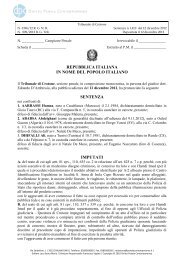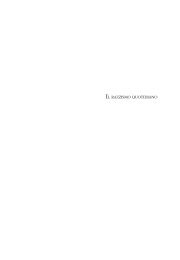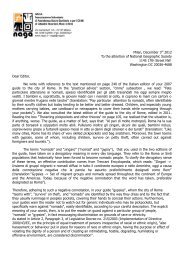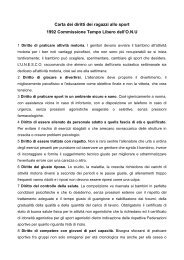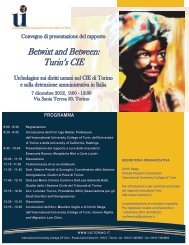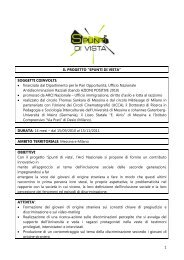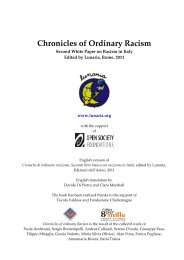Chronicles of ordinary racism 2011 - Cronache di ordinario razzismo
Chronicles of ordinary racism 2011 - Cronache di ordinario razzismo
Chronicles of ordinary racism 2011 - Cronache di ordinario razzismo
- No tags were found...
Create successful ePaper yourself
Turn your PDF publications into a flip-book with our unique Google optimized e-Paper software.
SECTION 2<br />
REGULATIONS AND CASE‐LAW<br />
Emergency as the norm.<br />
Institutionalized <strong>racism</strong> in the legislation on immigration from 2008<br />
onwards. Andrea Callaioli<br />
1. Does safety have a nationality<br />
Over the years, Italian legislation on immigration has become progressively more<br />
severe and unyiel<strong>di</strong>ng, its detachment from constitutional values growing more<br />
marked, with excessive enforcement <strong>of</strong> emergency decrees and use <strong>of</strong> “rule <strong>of</strong> law” as a<br />
deterrent against immigration. Furthermore, this stricter legislation has not only had an<br />
effect on foreign citizens hailing from tertiary countries, but also on those from the EU,<br />
<strong>of</strong>ten in open contrast with European community legislation. 169 The key idea behind<br />
this tendency has been the equating <strong>of</strong> migration issues with matters <strong>of</strong> public safety,<br />
mainly dealt with by means <strong>of</strong> emergency procedures. In other words, all the laws<br />
passed in this field during the 2008‐<strong>2011</strong> period were advanced not so much in view <strong>of</strong><br />
adapting Italian legislation to European <strong>di</strong>rectives or <strong>of</strong> solving, with adequate<br />
planning, the problems encountered during this time; instead, they were used as<br />
instruments that would help guarantee public safety 170 and, in particular, “the safety <strong>of</strong><br />
Italian citizens, compromised by foreigners” understood as separate, indeed, totally<br />
opposed to, that <strong>of</strong> all the in<strong>di</strong>viduals who inhabit the country, regardless <strong>of</strong> their<br />
citizenship or the stability <strong>of</strong> their con<strong>di</strong>tion. With these aims in mind, the methods<br />
used have been, among others, a ban on marriage for unauthorized immigrants, limited<br />
opportunities for stable integration for underage foreigners and restrictions applied to<br />
family reunification. These laws clearly have little to do with public safety. It seems<br />
obvious that the latter should represent a social value which may be applied in general<br />
to the civic cohabitation <strong>of</strong> all human beings rather than a negative value built<br />
exclusively on ones personal pre<strong>di</strong>cament as a foreigner. In other words, while<br />
recognizing the legitimacy <strong>of</strong> our Republic’s concern with controlling immigration, it is<br />
necessary to bear in mind that the safety <strong>of</strong> a community, in both its effective and its<br />
perceived aspects, cannot be enforced by means <strong>of</strong> legislation that proposes penalties<br />
against illegal immigrants as the main instruments in the fight to keep the migratory<br />
influx under control; on the contrary it should be done by instating a more realistic<br />
regulation <strong>of</strong> the influx, by introducing a standard procedure in which foreigners may<br />
shed their illegal status and by backing measures that favour effective social integration.<br />
The adjustments made to the Consolidated Law on Immigration since 2002 (namely<br />
the 189/2002 Law, better known as the Bossi‐Fini) had, in most instances, as a goal, or at<br />
least an outcome, the introduction <strong>of</strong> more rigid measures for (or, depen<strong>di</strong>ng on how<br />
169 Aside from the content <strong>of</strong> the 2008-2009 safety package, the most important decree is n. 32/2008, too lengthy to<br />
be expounded here.<br />
170 The names themselves <strong>of</strong> the laws better known under the hea<strong>di</strong>ng ‘safety package’ are significant: 2008 (Urgent<br />
measures in the field <strong>of</strong> public safety); 2009 (Rules in the field <strong>of</strong> public safety)<br />
66




